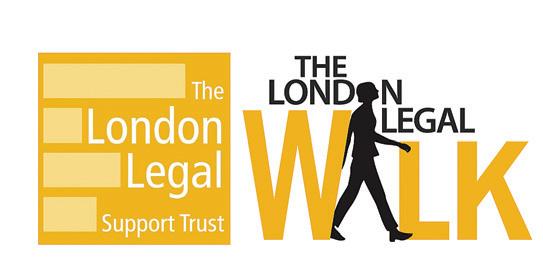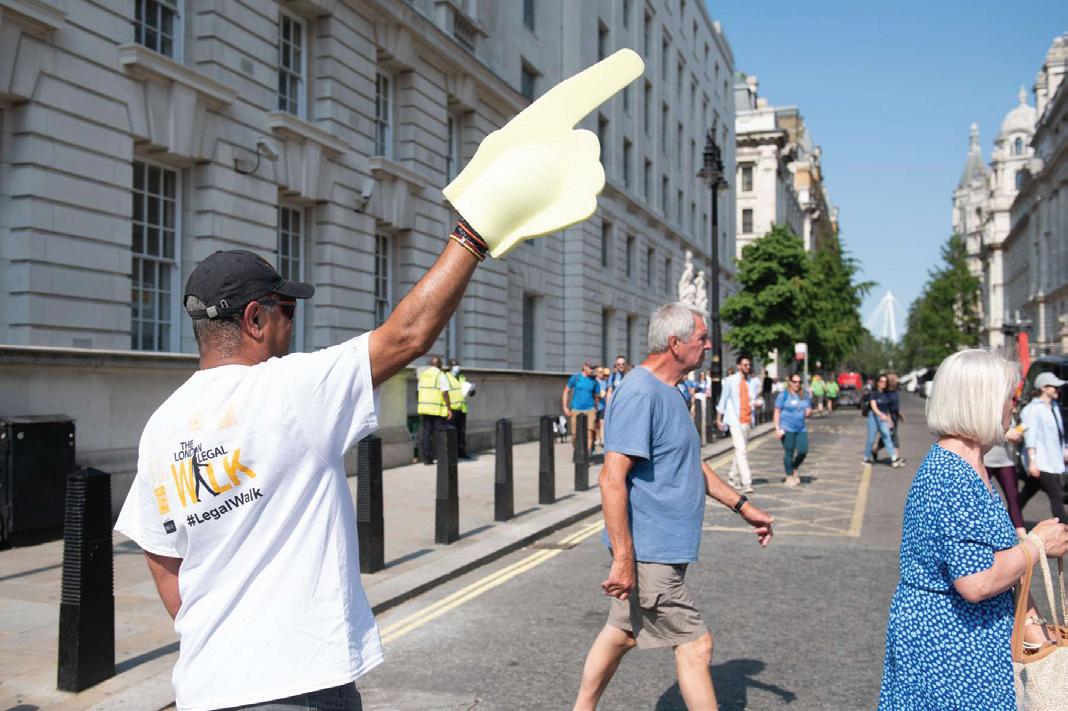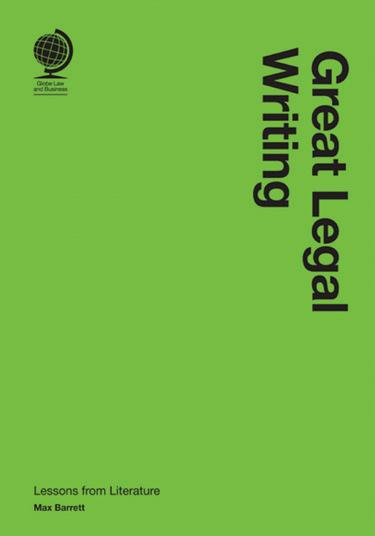
THE OFFICIAL JOURNAL OF THE WESTMINSTER & HOLBORN LAW SOCIETY | SUMMER 2023 London CENTRAL Lawyer Intellectual Property: from Creation to Use to Protection � Artificial Intelligence: issues for intellectual property lawyers � London Legal Walk 2023 � The Adventures of the Intellectual Property World


XXXXXXXXXXXX 2 | CENTRAL LONDON LAWYER Don’t change what you do. Just make it easier to do. See how Clio makes legal practice management easier. Discover Clio today at clio.com/uk/central-london or call +44-800-433-2546.
PUBLISHER
Ian Fletcher
Benham Publishing Limited

Aintree Building, Aintree Way, Aintree Business Park, Liverpool L9 5AQ
Tel: 0151 236 4141
Fax: 0151 236 0440

Email: admin@benhampublishing.com
Web: www.benhampublishing.com
ACCOUNTS DIRECTOR
Joanne Casey
SALES MANAGER
Catherine McCarthy

STUDIO MANAGER
John Barry
MEDIA No.
1951
PUBLISHED
Summer 2023 © Benham Publishing Ltd.
LEGAL NOTICE
© Benham Publishing.
None of the editorial or photographs may be reproduced without prior written permission from the publishers. Benham Publishing would like to point out that all editorial comment and articles are the responsibility of the originators and may or may not reflect the opinions of Benham Media. No responsibility can be accepted for any inaccuracies that may occur, correct at time of going to press. Benham Publishing cannot be held responsible for any inaccuracies in web or email links supplied to us.
DISCLAIMER
All views expressed in this publication are the views of the individual writers and not the society unless specifically stated to be otherwise. All statements as to the law are for discussion between members and should not be relied upon as an accurate statement of the law, are of a general nature and do not constitute advice in any particular case or circumstance.
Members of the public should not seek to rely on anything published in this magazine in court but seek qualified Legal Advice.
COVER INFORMATION
Photo by Bernd Dittrich on Unsplash.
Copy Deadline
10th October 2023
For the Autumn 2023 edition
Advertising
Anyone wishing to advertise in Central London Lawyer please contact Catherine McCarthy before the copy deadline. 0151 236 4141 catherine@benhampublishing.com
Editorial
Members wishing to submit editorial please send to: cwhlawsoc@gmail.com
Editor in Chief: Kene Onyeka Allison. Editorial Board: Lotus Kimona, Anamitra Mukhopadhyay, Sadie Thompson, Anita Winsome and Sarah Bradd
05 President’s Foreword
08 Sub-Committees
10 Event
11 Artificial Intelligence: issues for intellectual property lawyers
12 We don't just file trade mark applications
14 The Adventures of the Intellectual Property World
Just the Tonic: A look at IP Enforcement in the Scottish Courts
New Civil Practice Rules Facilitate Process Service by NonFungible Token (NFT), E-mail, and Other ‘Alternative Means’
Insights - “the value of the data that we hold” and “keeping our data safe- the human factor”

Demand continues to grow for web3 and virtual assets legal expertise
Harnessing and protecting the value of your IP International London Legal Walk 2023

Orbituary
Follow us on social media
CENTRAL LONDON LAWYER | 3
05
Contents
12 11 14

XXXXXXXXXXXX 4 | CENTRAL LONDON LAWYER How’s the weather looking this working week? Cloudy, but brighter with MyQuill. Quill’s cloud-based legal software is chock-full of new and improved features, giving you everything your law firm needs to manage your cases, contacts, and bills in just a few clicks. The result? A clear workflow, and a clearer head, no matter the weather. SCHEDULE A DEMO TODAY! 0161 236 2910 sales@quill.co.uk quill.co.uk MONDAY TUESDAY WEDNESDAY THURSDAY FRIDAY
The President’s Foreword
SUMMER 2023
Dear Member, Welcome to the Summer 2023 edition of Central London Lawyer..
We hope this edition’s focus on IP will be of interest to all our readers whether or not it is the main focus of your practice. Thank you to this edition’s Guest Editor Amanda Lathia, to our Editor in Chief Kene Onyeka Allison, the Editorial Board and to our contributors for all of their work on this edition of Central London Lawyer.
A team of Westminster & Holborn Law Society members enjoyed participating in the London Legal Walk on 13 June 2023, to help raise funds for the London Legal Support Trust; you can read more about this in this edition. I’m looking forward to seeing many of you at our upcoming events including the Summer Garden Party on 27 July 2023 and our Annual Dinner on 6 October 2023, which will take place at the House of Lords.
I always enjoy catching up with regular attendees at our events and meeting new members. We have so many fantastic and interesting members, from aspiring and junior lawyers to senior and former lawyers, working for and running a variety of law firms and organisations. Our Society is truly inclusive and welcoming. I am happy to call myself a member of Westminster & Holborn Law Society. In addition to hosting social and educational events, our Society is a wonderful breeding ground for ideas, partnerships, collaborations and friendships. We have opportunities to meet lawyers practising in other jurisdictions thanks to our international links and twinning arrangements with overseas law societies. We also maintain a good relationship with The Law Society of England and Wales.
I received the sad news of the passing of John Lewis, a former President of Holborn Law Society (pre-amalgamation of the societies) and am grateful for the beautifully written obituary I received from one of his children, a copy of which is printed in this edition. It is clear that John had a happy and fulfilling life and career. Our thoughts are with his family and friends at this difficult time.
This is the last edition of Central London Lawyer during my presidential year so I will take this opportunity to thank all of our members for your support and for attending our events; you make our Society what it is. Thank you to my fellow officers, members of the main committee and members of our Education & Training; Equality, Diversity & Inclusion; Junior Lawyers Division; International; Law Reform; Membership; Pro Bono and Corporate Social Responsibility; and Publicity and Social Media committees for all of your work. A huge further thanks to our Editorial Board for all of their work over the past year on Central London Lawyer. You can hear a summary of my presidential year when it concludes in October 2023, at the Society’s AGM. I hope to see you soon.
Best wishes. �
Nicola Rubbert President Westminster & Holborn Law Society

Iam delighted and honoured to be guest-editor of the summer edition of Central London Lawyer. I first began as a qualified solicitor in Holborn and now work in West London and Surrey but can easily find excuses to continue to enjoy the vibrancy of Central London! In this edition, I have focussed on Intellectual Property (IP) with additional insights on NFTs and cryptocurrency. My main message to you the reader is, if you are well-versed in IP law, to keep abreast of the evolving law around IP, particularly given the advancement of artificial intelligence technology. For those who have little to no experience of Intellectual Property, keep your eyes peeled as you might be surprised to learn how IP rights – and infringements – come up in various shapes and forms in everyday life! I hope you enjoy reading this edition. �
Amanda Lathia Guest Editor Solicitor, TWM Solicitors LLP

CENTRAL LONDON LAWYER | 5 INTRODUCTION
Nicola Rubbert
Nicola Rubbert President


Nicola qualified as a solicitor in 2013 with a boutique firm in the City that specialised in advising Japanese corporate clients. She has experience in-house and in private practice, focussing on employment, data protection and commercial law. Nicola is a Council Member of The Law Society of England & Wales, representing the constituency of City of Westminster and a member (and former Chair) of Westminster & Holborn Law Society’s Education & Training Committee. She is also a former Chair of London Young Lawyers Group, a Liveryman of The City of London Solicitors’ Company and a Freeman of the City of London.
Philip Henson Vice President
Philip Henson is a Partner and the Head of Employment at international law firm EBL Miller Rosenfalck, based in Farringdon. He also heads the North America desk and the China desk of the firm. He is the Chair of the WHLS Law Reform Committee. Phil and the committee research and reply to consultations on changes to legislation. Phil is looking forward to being more involved in the Society as the Deputy Vice President. Phil is involved in various charities and he is the Editor of City Solicitor magazine (the magazine of the City of London Law Society).
Outside of a busy work and family life, Phil also produces and occasionally writes short films. He has recently finished a script for a dark comedy called Viking Funeral which he plans to develop in 2022.
Nicola Wainwright Deputy Vice President
Nicola Wainwright is a specialist clinical negligence solicitor with more than 20 years’ experience. She is a Partner and Head of Clinical Negligence-London at JMW Solicitors LLP. Nicola specialises exclusively in clinical negligence claims for patients arising from medical treatment that has gone wrong, or from a failure to provide medical treatment. She has expertise in a wide range of claims, but particularly those that are complex or that result in severe, life changing injuries. Nicola has been ranked in Chambers & Partners legal directory for 14 years and has been described as a ‘highly experienced lawyer who achieves great results’ for clients. Clients describe her as ‘incredibly empathetic and understanding’ and as ‘having great communication skills’. Nicola qualified as a solicitor in 1997 after training with Pictons. She specialised in personal injury and clinical negligence at Davies & Partners, Birmingham before joining Leigh Day in 2000, since when she has specialised exclusively in clinical negligence. She was at Leigh Day for 20 years before joining JMW. Nicola is a member of the Law Society Clinical Negligence Accreditation Panel and an Association of Personal Injury (APIL) Senior Litigator. Nicola sits on the Westminster & Holborn Law Society CSR and Pro-Bono Committee. She is also a member of FOCIS (Forum of Complex Injury Solicitors), and the Association of Women Solicitors, London (AWSL).
Kene Onyeka Allison Editor in Chief


Kene is an in-house solicitor at Mizuho International plc, a Japanese investment bank. She is dual-qualified in England & Wales and Nigeria. Her areas of specialisation are Debt Capital Markets and Derivatives. She is the co-chair of the British Nigeria Law Forum Women’s Network and volunteers in different capacities with different organisations with the aim of improving ethnic and minority diversity.
Luke Silverman Administrative Secretary
Luke is a Trainee Solicitor at Macfarlanes LLP and the current Administrative Secretary to the Westminster and Holborn Law Society. Luke has a particular interest in matters concerning cryptocurrency as well as how the legal industry can become more Green. In his spare time, Luke is a keen cyclist and can be found speeding around Regent’s Park in the early hours of the day.


Matthew Allan Immediate Past President
Matthew is a solicitor-advocate at Greenwoods specialising in commercial litigation and international arbitration. He is also the Vice Chair of the Society’s International Committee which develops professional links with lawyers and their clients throughout Europe and further afield, with a particular focus on his native Canada. As the Immediate Past President of the Society, Matt’s priority is to continue his efforts growing the commercial connections with our twinned bar associations.
6 | CENTRAL LONDON LAWYER WHLS OFFICERS
Kene Onyeka Allison

Kene is an in-house solicitor at Mizuho International plc, a Japanese investment bank. She is dual-qualified in England & Wales and Nigeria. Her areas of specialisation are Debt Capital Markets and Derivatives. She is the co-chair of the British Nigeria Law Forum Women’s Network and volunteers in different capacities with different organisations with the aim of improving ethnic and minority diversity.
Sarah Bradd
Sarah is a Paralegal and a Future Trainee at Charles Russell Speechlys working for the Development Sales and Regeneration Teams. She is currently working towards completing her Fellowship for CILEx having completed her LLB at the University of Law. She is looking forward to starting her Training Contract in 2023. Sarah enjoys spending time on holiday exploring new places. When not working, she loves eating at restaurants and going to the cinema.
Lotus Kimona
Lotus works as a Paralegal in the matrimonial department at a law firm in Liverpool. She has various experience across different areas of commercial law but decided that Family Law is her preferred specialism. She has recently relocated but continues to support the editorial team remotely.


Anamitra Mukhopadhyay


Anamitra is a solicitor within JMW Solicitors LLP’s Commercial Litigation and IP departments. Anamitra advises clients across various sectors on a variety of matters including IP infringement issues, contractual breaches and civil fraud. Prior to entering the world of law, Anamitra completed a History degree and has a passion for the subject. Aside from History, Anamitra’s other love in life is music. She is a keen singer and enjoys performing.
Sadie Thomson
Sadie is an Associate within the Business Crime and Regulatory department at JMW Solicitors LLP. She advises individuals and companies in respect of various allegations including financial crime, violence, drug and motoring offences. Sadie joined the Manchester office of JMW in 2017, having completed a History degree at the University of York. She transferred to the London office in 2022 and is enjoying all that the city has to offer!





Anita Winsome
Anita is an LLM student specialising in Comparative & International Dispute Resolution at Queen Mary University of London. Her interests include domestic & international arbitration, competition law and intellectual property rights. She is a qualified lawyer in India and is a licensed member of the Bar Council. Her favourite pastime activity includes exploring the beautiful cafes, museums or the parks at South Kensington.
CENTRAL LONDON LAWYER | 7 WHLS EDITORIAL TEAM
To advertise in Central London Lawyer, please call Catherine McCarthy our Business Features Editor on 0151 236 4141 or email catherine@benhampublishing.com Want to feature in Central London Lawyer?
Social Media and Publicity Committee Update
This quarter was busy as any other for the Westminster and Holborn Law Society (WHLS) and we are excited to soon announce our upcoming plans and events you wouldn’t want to miss.
Back in March, Dr Domenico Giannino shared his findings of a research he conducted on The Inter-American Court of Human Rights and Protection of the Environment. It was an enlightening piece which saw huge engagements from the WHLS members and the University of Law students in attendance.
In April, one of our members embarked on a quest to raise funds for the National Autistic Society (NAS) for World Autism Awareness Week 27 March to 2 April 2023. Raising awareness of autism and autistic people means a lot to her as she is hoping to one day create an awareness that, no matter what limitation society may place on people with autism, it does not in any way define who they really are. Due to the helpful support of her work colleagues at KWW Solicitors in East Molesey and other contributors the NAS has gratefully raised £181,795! The NAS has created a project called the Moonshot vision where they are seeking to create a society that;
• Values autistic individuals
• Maximises autistic power
• Guarantees support
• Adapts public spaces and services
• Free from discrimination
Amazing initiative and very well done to our member for contributing to the work of the NAS.
Our Junior Lawyers Division’s panel event, ‘How to succeed at a career in legal practice: From a Barrister’s perspective’ was scheduled for 16 May, but was unfortunately postponed. The WHLS JLD wishes to once again offer an apology to the panellists and guests. We are now planning a re-schedule of this event and will provide further information in due course… Watch this space!
Falguni Desai, a member of our Membership Committee, an experienced Business Growth Coach and a Lawyer has now added an extra accolade to her already growing list… an author. Having co-authored the now published, ‘Fab Collab – How women create success’ saw 15 successful business women and authors in total, celebrating Collaboration. To borrow a quote from the said book, ‘You don’t need to – and can’t – do it all by yourself. Collaboration with others is a more effective (and fun) way to achieve success, both in life and in business’. I couldn’t agree more!
This year’s London Legal Support Trust’s, London Legal Walk 2023 in it’s 19th year of existence, saw in excess of 16,000 walkers in and around the streets of London. With a small team of walkers and helpful donations received, we were able to contribute towards the overall and overwhelming financial support received towards the aim of providing free legal services to those most in need.
In June we once again collaborated with the University of Law Bloomsbury campus where Dr Michael Russ presented a fascinating talk on his research which examines whether the European Union’s use of internet platforms to regulate mis/ disinformation are proportionate interferences with the right to expression. In this highly insightful talk, Dr Russ focused on the harm caused by mis/disinformation, an outline of the protections for its distribution and an explanation of emerging legislation which aims to strike the right balance between these two opposing concerns.
The last Saturday of June each year is celebrated as Armed Forces Day (AFD). On 24th June this year, AFD was celebrated in many communities around the UK, in support of the men and women who makes up the Armed Forces community to include the serving troops, the families, veterans and cadets alike. The WHLS JLD took part in the online campaign with members joining the #saluteourforces.
Save the dates:
We are excited to announce dates for our calendar events… please stay tuned for further details!!.
� WHLS Annual Dinner – 6 October 2023
Catherine Michel is the Co-chair of the Equality, Diversity and Inclusion committee of the Westminster and Holborn Law Society alongside Coral Hill. Catherine works as a Senior Solicitor at Capsticks LLP and specialises in Clinical Negligence.
Rebecca Taylor is the Secretary of the Equality, Diversity and Inclusion committee of the Westminster and Holborn Law Society. She works as a trainee solicitor Dawson Cornwell LLP who specialise in International Family Law and is due to qualify in September 2023.
Our next meeting is taking place on 2 August and anyone who would like to find out more would be welcome. Please contact Catherine or Rebecca to find out more at rebecca.taylor@ dawsoncornwell.com We always welcome new members so please do get in touch.�
8 | CENTRAL LONDON LAWYER SUB-COMMITTEES
The Equality, Diversity and Inclusion committee of the Westminster and Holborn Law Society.
Council Meeting 04 July 2023
Secrecy and The Law Society
The author has written this article in his own capacity and his views do not necessarily reflect those of Westminster & Holborn Law Society or The Law Society of England and Wales.
On behalf of Central London members, I moved a motion at the The Law Society’s (TLS) most important decision making body, the Council. It was about its own openness and transparency. I wanted Council members to know why ordinary members should not know what was discussed during parts of Council meetings.
I have been saying that TLS Council should not debate important issues in secret. Some agenda items, too many, are designated Part 2B, are confidential. The TLS' Freedom of Information Code of Practice defines what should be confidential.
On 04 July 2023, Council members heard my speech that explained the motion. With Mark Evans, from Wales and TLS Deputy-Vice President candidate, seconding, I wanted to give a tour de force as to why TLS should live up to its aims. This is what I told the meeting.
Lifting the veil of secrecy from Council meetings will be a processthis is the first stage of that process.
The Motion, the public part of the agenda
‘The Council of The Law Society of England and Wales (Council) reaffirms its commitment 'to maximum openness, and aims to conduct as much of its business as possible in public'.
It is acknowledged that on occasions confidential discussion will be unavoidable and Part 2A and Part 2B papers will be justified.
The Council instructs those that compile papers for Council, Board and committee meetings to add a written explanation for each item that appears on Part 2B of the agenda explaining why and how that item has engaged any of the limitation/s of the Freedom of Information – Code of Practice as adopted by Council in March 2017.’
Paul Sharma’s speech to move the motion

“Too much time spent on Part 2 the secret part of the agenda and too little time on Part 1 – the open part of the agenda. This motion is designed to encourage those that compile the agenda to be transparent and list items for Council on Part 1 of the agenda unless there are compelling and valid reasons for the item to appear on Part 2.
Of the last three Council meetings of around 66% of the time was spent discussing items on Part 2 secret part of the agenda. Not one person is here in their own right – we’re all elected. We represent geographic constituencies, personal characteristic or work groups.
When we debate items on Part 2B – we cannot tell
• our constituents, those who elected us,
• cannot tell our local law society, and
• cannot tell our electors, the:
• subject matter of our discussion
• contents of the debate that took place
• cannot tell our electors the decisions we make in their name.
We can tell those that vote for us didley squat.
It’s all TOP SECRET!
Democracy is more than an election once every four years and then secrecy for four years – trust me but I can’t tell you why! That’s the democracy of Vladimir Putin.
The Law Society (TLS) – presently we can rightly be dubbed the secret society.
It’s TLS culture. We have slipped into a freemasonic style culture of secrecy over the years. It’s not just Council meetings, the culture of secrecy covers the whole shebang.
I got elected to PRAC (Policy and Regulatory Affairs Committee) and received this letter telling me about it.
I quote:
‘Matters dealt with by our committees are treated as private and confidential and we are sure that you will bear this in mind when dealing with business coming before the Committee.’
By the way those voted for me thanks – your tenner’s in the post –
that’s a joke. Is TLS unique?
Does TLS deal with special issues other organisations do not deal with?
Local authorities let contracts, trade unions deal complex issues, charities deal with sensitive matters – yet, they all manage without copying the freemasons and hiding behind the cloak of secrecy. We are not that special, that different or unique why we must hide from our own members what we do in their name.
How we conduct our proceedings is in breach of the Governance Manual.
Para 5.16 of the Governance Manual 5 December 2018 reads: ‘The Council is committed to maximum openness, and aims to conduct as much of its business as possible in public.’
We have not just put a coach and horses through the Governance Manual - we have put an express train through it.
OK, next bit is the science bit – stay with me.
Part 2 is the secret bit of the agenda. Part 2 is divided into: Part 2a and Part 2b.
Part 2a – items labelled 2a- you can tell our members. You can tell our members – 200,000 members but don’t tell anyone else - shush. Tell 200,000 members – you might as well send a press release to Reuters, Press Association and the BBC.
That’s how many people were at Glastonbury. You may as well get Elton John to sing Part 2a on stage - that’s how secret it is.
Part 2b is where the top secret matters are discussed.
But still the focus of this motion is Part 2b. Part 2a. can stay. Inevitably, here comes Hamlet - 2b or not 2b? That really is the question.
For a matter to qualify for Part 2b and be rendered top secret it must fulfil the requirements of one of the paragraphs of the Freedom of Information Code 2017. There are 12 paragraphs to choose from. What this motion seeks are particulars from those that compile the agenda to justify why any Part 2b item has engaged any of the paragraphs of Freedom of Information Code 2017.
The particulars may well reveal justifiable reasons why the paragraph of the Freedom of Information Code that has been chosen, renders an item top secret and therefore legitimately on Part 2b.
Or on the other hand, the obligation to justify the deployment of any of the paragraphs in the Freedom of Information Code may just lead to reconsideration and reflection on whether the items should be really be rendered top secret.
Therefore, can the items be put on Part 1 of the agenda so we can all discuss them with our electors, our local law society and members. So, in essence all I am looking for is justification. What I am seeking is a cultural change from secrecy to openness and transparency. There really is no need for such intense secrecy – after all, we’re not the US military hiding aliens from the public!
This is a modest proposal – not of the Jonathon Swift kind – but a modest change to steer the agenda of council meetings to fulfil the requirements of the Governance Manual.
A modest proposal to enable far reaching changes on how we do business. The first step in our cultural change.”
(End of speech)
The vote: For - 64 for the motion, 9 abstentions and 5 against.
CENTRAL LONDON LAWYER | 9 OPINION
Paul Sharma Council member for Central London
London Legal Walk 2023 –The story of a first-time walker

Ihave always wanted to attend the London Legal Walk and the thought of walking 10km sounds very daunting, especially if you are not topped up on your fitness. I have somehow always convinced myself that I am not fit enough to take on such a mammoth physical challenge, at least that’s the way it appeared in my lens. However, I made it a personal mission to take the plunge this time around on 13 June 2023. Along with a team from Westminster and Holborn Law Society, I joined the swarms and droves of legal professionals and supporters that descended on London Town in their thousands, in support of the London Legal Support Trust’s (LLST) 19th annual London Legal Walk.
‘There are over 13.4 million people living in poverty in the UK and advice providers like the Law Centres, Citizens Advice services and refugee specialist support services are at a breaking point. Many people cannot afford to pay for legal advice when it is most needed. The London Legal Walk raises those much needed funds ensuring that the most vulnerable in society receives the legal support they need. The London Legal Walk supports over 100 legal advice agencies in London and the South East. These agencies do an excellent job in offering support to the members of the various communities and helps to change lives everyday’.
The London Legal Walk is a highly anticipated event on the legal calendar each year and teams are encouraged to raise funds in support of free legal advice agencies in London and the South East. Our team joined the multitude that temporarily populated the streets of London for the 10km walk, choosing the park route. We set off from the Law Society in Chancery Lane, walked towards Temple Underground, although this leg of the journey felt more like a sprint to me. We then headed through to Whitehall, into St James’ Park out towards Buckingham Palace, up Constitution Hill, then through Hyde Park. By this time the penetrating sun rays planted seeds of doubt in my mind of whether I’ll be able to continue, let alone finish the walk. We next went across the Serpentine bridge to converge on the other side of Hyde Park heading back towards the starting point. As we headed back anyway, I had to now commit to finishing the walk. The team was a major reason my internal battle to abort the mission didn’t last very long. We went from one riveting topic to the other, so I was totally invested and could not dare miss the conclusions, if there even was any.

The highlights from the event for me was firstly, when we came across a keen-eyed artist, meticulously creating a work of art of a Royal Horse Guard as he stoically performed his duty. We bravely posed alongside to have our own photo op, let’s just hope the artist didn’t retain a blur on his artwork from us scurrying out of his line of sight. Next, it was the sea of colours that decorated the streets of London, as over 16,000 legal professionals and supporters gleefully clustered in their teams with the sounds of laughter and chit chat echoing from every direction. It was undoubtedly a sign of unity for juniors, seniors and partners whether support staff, trainees or qualified solicitors that is, every man, woman and quite literally their dogs, came together in support of such a great cause.
Then, a pit stop… or two! Well, why not? After all, I dreaded the thought of the ‘challenge’ before I started, which by the half-way point my hips and knees felt like they were on borrowed time. So, a welcomed break or two was inevitable, as the rest of the team was sympathetic and agreed but after 10 minutes we were all good to move swiftly along. As we drew nearer to the end, we decided on a last minute moral boost in a bottle before we enter the final approach to base.
Lastly, I dare not forget the street party! Well we didn’t actually ‘partied’ on the street, but we were present to hear the Lord Chief Justice and the President of the Law Society’s speech at the end of the walk and believe it or not an impromptu private performance by the stilt walkers. What a treat that was… oh and there were canapés too!
We are delighted to have contributed to the overall donations of, at the time of writing, £860,000 in support of free legal services for the legal advice agencies. We are grateful to those who have contributed and will greatly appreciate further contributions. This was an experience I will always remember, not just for the buzzing atmosphere, the aesthetically pleasing colours splashed around London or the enthusiasm of the walkers and runners, but for being a part of something bigger. Our collective contribution will help to provide the necessary legal support to the most financially vulnerable people in London and the South East. So until next year, let’s raise a virtual glass to exceeding the LLST’s target and counting… for more access to justice and free legal advice.
Our team of walkers included:
President of the Westminster and Holborn Law Society
(WHLS) – Nicola Rubbert
Immediate Past President of WHLS – Matthew Allan
Deputy Treasurer – Timothy Evans
WHLS JLD Committee member – Jesislava Miladinovich
WHLS JLD Committee and Social Media and Publicity Committee member – Nedra Daniel

WHLS member – Shehzad Babar
WHLS member – Wil Rutherford Kaplan
“Donations can still be made to WHLS’s team page, for a limited period https://londonlegalsupporttrust.enthuse.com/pf/ westminster-holborn-law-society-2023
Donations of all sizes will be gratefully received”.
Nedra Daniel WHLS JLD Committee and Social Media Publicity Committee member
10 | CENTRAL LONDON LAWYER EVENT
Artificial Intelligence: issues for intellectual property lawyersrs
Artificial Intelligence (AI) and its inventive spin-offs is undoubtedly pushing the boundaries of intellectual property (IP) law.
We may worry about AI’s negative possibilities: a dystopian vision of robots hell-bent on world-domination. The Future of Life Institute, Elon Musk, and Google have agonised enough in calling for a six month moratorium on further AI development. Hopefully, the ethics of AI and its management will follow swiftly enough to allay some of these fears. The impact on jobs, medicine, education, creativity and society generally of AI is incalculable.
The challenge comes from the fact that AI is not the usual software that operates in accordance with the programs that humans create. AI will make its own rules. Language models such as Chat GPT effectively mimic the neural architecture of the brain so they can throw up the unexpected. Google’s LaMDA model translates Bengali despite not having been trained to do so.
It is new technology so the IP world will have its own anxieties – will IP rights such as patents and copyright be fit to protect the outputs that AI generates? Are they up to scratch to restrain infringements of IP arising from the use of AI applications?

The core balancing function of IP is the reward and protection of human creativity – technical inventions, images, software source code or the written word – at the same time securing the benefits of these outputs for society at large. The advantages conferred by AI will only be delivered if its human originators can use IP to secure commercial rewards. AI should not be feared, if IP can be harnessed and protected in entirely new situations that AI may generate.
Which IP rights are relevant?
Patents
Patents may protect technical inventions and processes that are novel (not having been previously disclosed except confidentially) and showing an inventive step that is not obvious. If the invention has been implemented by a computer, it may be patentable if it has a technical effect. The underlying software, a mere concept, a purely digital process, the software/hardware interface, or a method of doing business cannot be patented. These principles apply to AI systems. But what of otherwise potentially patentable inventions that have been automatically devised by AI? Examples might be methods for collecting biometric data for AR and metaverse applications. Such inventions may fulfil the criteria of novelty, inventive step, not being obvious, and having industrial applications. But there is absence of a human inventor. Dr Stephen Thaler tried to register his DABUS AI system as the inventor of a patentable technology, but in the UK it should not be possible for anything other than a human being to be shown on the patent as an inventor. This the subject of an appeal to the Supreme Court. Since patents are centred on human creativity, how can there be an “inventive step” when the invention has been wholly created artificially when inventiveness is an intellectual function? Under the Patents Act 1977, the inventor must be the “actual deviser” which must always a person. Again, the test of what is “obvious” involves a human judgment, not the decision of a machine.
Copyright
AI source code may itself be protected automatically and without formality as literary copyright. But to qualify for copyright protection, there must be a degree of originality - the code must not have been copied from elsewhere.
What is protected is the literal expression of the code itself not what
effect it achieves. It is difficult if not impossible (unless there has been a breach of confidentiality) for a third party to get its hands on the code itself or the algorithms or the data on which it is trained. However, any reproduction of the function of the program will not be an infringement of copyright if those functions have been replicated independently.
Under the Copyright, Designs and Patents Act 1988, there can be copyright in computer-generated works but the owner will be the person who makes the arrangements necessary for its creation. We can say that the “arrangements” involve human skill, labour or creative choice so there will be originality.
The worry for copyright owners however is that someone else’s AI, perhaps without deliberate human intent, make copies or use datasets that would infringe their copyright. A recent case was brought by Getty Images against Stability AI, a generative AI platform which happened to create artwork based on existing third-party copyright images and connected metadata. AI platforms can produce articles (not this one!), books, examination scripts and music as well as pictures. The problem is that it will often be difficult to show that an AI product is an infringing copy. The opportunities for infringement are manifold: some relevant issues will be clarified by court cases.
UK Government AI/IP consultation
The Government has responded to the consultation exercise issued in 2021. Despite options to adapt the law to accommodate transformative AI developments, it has taken a reserved view. The Government won’t address the question of whether an AI application can be a patent inventor until the Supreme Court has handed down judgment in the Thaler case.
No change is likely with respect to ownership of copyright in AI works since the “arrangement” provision for computer-generated works is thought to be adequate. There has been allowance for a limited exception to copyright law for text- or data-mining (TDM) but only if TDM is used for training AI for non-commercial research purposes.
Conclusions
AI is giving rise to wholly new situations that are created by machines that are intelligent (artificially) but not intellectual. This goes to the root of what IP is all about – the fruit of the human mind. It may however be impossible to identify human inputs where AI is used. This challenges will be tested in litigation with arguments trying to strike a balance between AI’s vast possibilities and the rights of creators of mainstream copyright works. �
CENTRAL LONDON LAWYER | 11
Laurie Heizler Partner TWM Solicitors LLP
ARTICLE
Laurie Heizler
We don’t just file trade mark applications-
how a Trade Mark Attorney can help with anti-counterfeiting strategy

The counterfeit goods industry is estimated to be worth an eye-watering US$600 billion a year. It is thought that as many as 10% of all branded goods sold may be counterfeit, with 80% of us having (knowingly or not) handled fake goods.
With figures this high, it is odd that until the last 6-7 years of my 20+ year career as a Trade Mark Attorney I hadn’t had much involvement in anti-counterfeiting. But with new clients and new challenges it has been a focus of my practice over the past few years.
It’s a lesser-known part of our job, different from the usual trade mark prosecution and dispute matters that make up the majority of our day-to-day work. But it’s an important, and fascinating, aspect of our role. My work in this area for a skincare client, with the help of the City of London Police’s IP Crime Unit (PIPCU) recently brought two counterfeiters to criminal conviction.
Online sales account for an increasingly large proportion of the figures above, the development of digital technologies, evolution of freight systems and globalised banking systems all playing their part.
Counterfeiters operate in all markets, from consumer goods (everyday items as well as luxury) to pharmaceuticals, industrial components and automotive parts. Protecting brands against offline and online fakes is a huge challenge, but not doing so can negatively and immeasurably impact brands. Almost 40% of fake goods detained at EU borders have been found to be dangerous to consumers; think of the dangers of fake airbags in cars, or fake skincare products you might apply to a baby’s skin. Harmful or poor-quality goods also stand to damage the reputation brands have worked hard to build, and sales of unauthorised goods divert sales, leading to a reduction in profits.
There’s also a wider impact; lost sales due to counterfeiting means billions in lost taxes, as well as job losses. Counterfeit goods are linked with organised crime, with the purchase of counterfeit goods funding crimes like money laundering and illicit drug distribution.
12 | CENTRAL LONDON LAWYER ARTICLE
Rachel Harrison
I’ve seen brands take a zero-tolerance approach to counterfeits, while others turn a blind eye. In some cases brands feel it’s too costly to pursue every instance of unauthorised goods they find. In others, they appear to want to avoid the publicity that prosecuting the counterfeiters may invite. Unfortunately, not tackling counterfeiting head-on allows it to continue to grow year on year.
Even if a brand doesn’t have a big budget, there are simple, cost-effective measures they can take to monitor and address counterfeits. Every counterfeit item taken off the market is a step in the right direction.
Here are some examples of accessible measures brands can start with:
Monitor and authenticate Specialist companies offer a range of monitoring and authentication options enabling companies to monitor sales or listings, and allowing consumers to authenticate products once they are purchased.
Register brands with rights owners’ programmes offered by online marketplaces
Two of the major programmes are Amazon’s Brand Registry and eBay’s Verified Rights Owner (VeRO) programme. Platforms will usually suspend listings whilst the suspected counterfeits are investigated.
Check consumers’ comments and reviews for reports of fake products
This can be a quick and easy way of flagging suspected counterfeit goods. Consumers often leave negative feedback if they believe they have received a counterfeit product or if a products is sub-standard.
Make test purchases and send ‘cease and desist’ letters
If products look suspicious, they can be purchased, tested and, if found to be counterfeit, used in further action against the counterfeiter. Letters before action can stop counterfeiters quickly, particularly smaller sellers. They can also be used to extract key supply chain information enabling further investigation. Private investigators can be used to make discreet purchases or approaches to counterfeiters.
File Applications for Action (AFAs) with Customs authorities
This can be done in most countries and is the most effective way to support local Customs authorities to seize suspect goods as they enter the country.
Civil or criminal proceedings
If trade marks or images of a company’s products are used by counterfeiters, consider civil court proceedings which offer remedies such as injunctions, damages, an account of profits and delivery-up and destruction of infringing products. Criminal proceedings are also available. I work with various organisations including the UK National Crime Agency (NCA) and PIPCU, particularly in cases involving a threat to consumer health and safety.

Trading Standards
Reports can be lodged at local Trading Standards offices. These authorities have the power to seize and investigate reports of counterfeit or infringing goods.


Educate consumers
Consumer awareness can be crucial to minimising counterfeits. If consumers can readily detect a fake product or know how to report or verify one, this can be a first line of defence. It also protects them from potentially harmful products. Providing details on company websites on how to spot and report counterfeits is usual these days and shows a brand’s engagement with the issue. �
Harrison
ARTICLE CENTRAL LONDON LAWYER | 13 SPECIALISTS IN THE ANALYSIS OF ROAD TRAFFIC COLLISIONS Providing tailored solutions for the investigation of incidents involving road users of all types ANALYSIS FCIR EXPERTS IN COLLISION INVESTIGATION 020 3004 4180 office@FCIR.co.uk www.FCIR.co.uk WE ARE HAPPY TO DISCUSS YOUR INDIVIDUAL NEEDS CONTACT US TODAY: COLLISION RECONSTRUCTION VEHICLE EXAMINATIONS EXPERT WITNESS
Rachel
The Adventures of the Intellectual Property World!
The Red Tube Man
One of the inevitable issues that successful Brand Owning clients face is the presence of counterfeits in their marketplace at some point. Nevermind the second half of the full Oscar Wilde quotation “Imitation is the sincerest form of flattery that mediocrity can pay to greatness,” instead consider the lost sales, reputational damage from inferior quality, or even direct harm to consumers, the lack of return from R&D investment, the untaxed shadow-economy and the criminal gangs much of this trade supports as they launder money from other activities including drugs and trafficking. It can be very serious stuff below the surface.
In most cases, you will need two main things as a precursor to stamp this out, whichever method or jurisdiction is involved. The first is an example of the fake, and the second is a receipt to prove it was sold by that seller (bearing good solid time, date, location & identity information, and ideally referring to the fake by name).
Behind those basics, a raft of other things may also be needed depending on the type of action being taken. For a takedown notice from a reputable platform, you might not even need a purchase as a screenshot will do, for a Cease & Desist with Undertakings and further investigations into the supply chain perhaps all the way to the manufacturer, that is only the start. Sometimes, if the value to the client is very large and they need to find the factory, we will typically develop a small repeat purchasing relationship with the highest point in the chain, leading to a tracked product return in due course. We always mimic the typical customer profile and payment method that that trader would normally deal with, including perceived nationality and location (phone dial code, .suffix of email, and geo-specific social media) so they will trade easily with us. Surveillance is an option sometimes, but this is expensive because of the time it can take and is open-ended unless we already have delivery information from, for instance, placing an advance order against a pushed-for delivery date.
In a UK retail outlet buying the sample with a receipt can range from simple, to Pop-Up-Shop hard. Then there are street markets, online sellers on platforms and those in closed-user groups, or only on social media Apps, plus non-English language sites from anywhere in the world selling into the UK, and so on. It is not an endless list, but it is long and ever evolving.
Here are a few real issues to be aware of so that you or your client can get the ball rolling.

Well-established street markets have WhatsApp groups. It is useful if there are thieves about or just to know if their café is closing early. Most punters don’t ask for a receipt from a market, some do of course, but not after they’ve asked a host of other things. The Grand Bazaar in Istanbul gave us a good example of how this can act as a trigger to expose evidence gathering. An expensive and convincing copy of a designer bag was being sold by around 20 sellers there. The Brand first sent a local lawyer in to collect evidence. He asked the first stallholder he found with the bags on show if the bags were popular, if they sold well, if they had the full range of sizes, had any branded accessories, how long had they been selling them for and so on, and then bought one and asked for a receipt.
The trader noticed the customer did not fit the usual pattern so surreptitiously took a picture of him and posted it to their group (1000+ members) saying that this man had just bought the handbag for his wife but was nosey and didn’t haggle enough. The lawyer engaged a second seller several hundred meters away a few minutes later saying he wanted a bag for his wife, but this time the sale was refused “display only” and he was turned away. All the traders throughout the Bazar removed these bags from view within seconds of the next WhatsApp confirming their suspicions from this second stallholder. On top of that, the lawyer was followed back to his office unaware that he had been exposed and in the belief that there were hardly any sellers doing this at the market, so it was a small problem. As more reports and complaints from customers about these fakes reignited the Brand’s interest in the coming months, the matter was passed to us. First, we did a simple “only looking” mapping exercise of all the stalls involved before selecting two key cascade stockists to focus on, gathering evidence and samples from it, and then raiding while only serving warning letters on the rest. It was effective and shut down the problem because the small sellers saw the biggest ones had lost stock that they had paid for and didn’t want to be next. The makers of the counterfeit themselves too realised the brand was coming for them and most probably switched to copy another name. The main thing is that it stopped.
In UK market towns with registered pitches, we use a ploy to get from the stallholder to their supplier that normally works and cuts through time-consuming costly alternatives. A pair of us look for the most well-established marketeer selling the item, preferably reputable with a long history at the market, and one of us will buy some of the fakes from them and briefly retreat. Next two of us go back to him a few minutes later and quietly explain that we represent the Brand Owner of the items he has just sold to us and that we have filmed evidence of him selling fakes but that we don’t want to waste time going through the legal process with him, or the market’s authorities with the other stalls involved, as our aim is to only to stop those distributing it, rather than the small-scale sellers. Instead of taking this further, if he will tell us his supplier, his involvement will be over and kept confidential. It mostly works.
So often the trail up the chain from the seller to the maker encounters a P.O. Box or other multiple business mail drop address. A fast method to uncover the user can be to send them an electronic tracker, but this must be legally acceptable under all the circumstances of the case and might also alert them when it is unpacked. A softer, easier trick is to deliver an unusually shaped parcel for them that we can easily identify from a distance. We needed to know the true identity of a high-volume electronic games seller using a mailbox address. Around 300 other businesses were using the same address, that had a receptionist, so it would have been hopeless to wait inside the building to try and intercept Box 262. The boxes themselves were not visible from the public area. We sent them a meter-long red tube containing electronic game posters and waited outside for the Red Tube Man to lead us back to his true trading address. �
14 | CENTRAL LONDON LAWYER ARTICLE
Duncan Mee
Duncan Mee
Just the Tonic: A look at IP Enforcement in the Scottish Courts
In recent years, the UK courts have witnessed several high-profile "supermarket wars" cases, involving budget supermarkets facing legal action for alleged infringement of intellectual property (IP) rights in popular products. Notably, Marks & Spencer's claim against Aldi over their Colin the Caterpillar cake has garnered significant attention. Similarly, Scotland has seen a notable case with cross-border implications, aligning its IP enforcement approach with that of England and Wales.
Not having to Gin and bear it
While Scotland is renowned for its whisky industry, its gin sector has also flourished. One prominent brand in the craft gin scene is Hendrick's Gin, produced by William Grant & Sons Ltd, recognized for its distinctive "medicine" style bottles.
The German discount supermarket Lidl is well-known for stocking own-brand goods including Hampstead Gin. In December 2020 Lidl re-launched this product across the UK in a new-look bottle which bore more than a passing resemblance to the Hendrick’s medicine bottle.
William Grant & Sons raised proceedings in the Court of Session (equivalent to the High Court) in Edinburgh seeking an interim interdict (i.e. an injunction) against Lidl to prevent it from selling its rebranded product on the basis of trade mark infringement and passing off1
At first instance the Court found that no likelihood of confusion existed between the two products. Accordingly, arguments under s.10(2) of the Trade Marks Act 1994 and the law of passing off were not successful.
However, the Court did determine that the claimant had set out a prima facie case under s.10(3) of the 1994 Act. Hendricks enjoyed significant goodwill and reputation and Lidl was seeking to take unfair advantage of the Hendrick’s mark by redesigning the Hamstead bottle to resemble the Hendricks’ product and then selling it at a considerable discount.

An interim interdict was granted pending full trial. However, this only prevented the sale of the infringing Hampstead bottles in Scotland. Raising a glass (and an appeal)
Both parties appealed. In its cross-appeal Hendricks sought to widen the scope of its interdict to cover the whole of the UK to dispense with the need for parallel proceedings in England.
The Inner House (the appellant Court) confirmed that when a defender is domiciled in Scotland, the Scottish Court has jurisdiction to prohibit infringing activities, regardless of where they take place. If the infringement occurs in Scotland but the defender is domiciled elsewhere, the court can only prohibit the infringing activities conducted within Scotland. In this specific case, Lidl was found to have establishments in both Scotland and England, establishing its domicile in both jurisdictions.
As a result, the territorial scope of the order did not need to be restricted because Hendricks chose to initiate legal proceedings in Scotland.
Putting a Kilt on IP Enforcement
The Hendricks case has highlighted some of the benefits to brand holders seeking to enforce their IP rights in Scotland where injunctive relief can be granted on a UK wide basis.
Solicitors and their clients based south of the border might want to consider whether raising proceedings in Scotland could be tactically advantageous. Some considerations are set out below:
• As an economy with a number of IP rich sectors including oil and gas, hospitality and tech the Scottish Courts are used to hearing applications regarding IP infringement and the Court of Session has a number of specialist IP judges who actively case manage actions using a streamlined procedure.
• There is less of an emphasis on pre-action protocols in Scotland. Actions can be raised without the need to send pre-action correspondence. Likewise, applications for interim interdict are also regularly heard without notice to the other party and without the need for extensive evidence and affidavits.
• Parties who believe they might become involved in litigation in Scotland should consider lodging caveats in appropriate courts. Providing a caveat is lodged they will be given advance notice of any attempt to seek an ex-parte interim order in that court and will have an opportunity to oppose the application.
• When seeking an application for injunctive relief there is also no requirement to provide a cross damages undertaking to the Court. However, if an interim order is obtained and subsequently recalled then this could give rise to a counterclaim.
• English solicitors are often surprised to learn that there is no general duty of disclosure in Scottish Court proceedings. Documents can be recovered from parties to the action as well as third parties through a process of targeted disclosure. What can be recovered is closely tied to the parties’ written pleadings to prevent so-called “fishing expeditions”.
• Generally speaking, the costs of litigating in Scotland are lower. The lack of disclosure and pre-action processes can also alleviate the costs burden of litigation. There is no requirement to submit cost budgeting to the Court and Court fees are considerably lower (approximately £300 regardless of the size of the claim).
• The rate of recovery of judicial expenses (i.e. costs) is generally lower in Scotland. However, costs uplifts can be obtained where matters are sufficiently complex (with IP cases usually meeting this threshold). English solicitors’ costs can be recovered as part of Scottish proceedings provided they are reasonably incurred. Finally, the Scottish Courts attract less publicity than those in England & Wales even where relatively high-profile parties are involved. This may be of some advantage particularly when combined with the element of surprise which can be leveraged by bringing proceedings in an unfamiliar yet user friendly and cost-effective jurisdiction. �
Iain McDougall Partner MBM Commercial LLP

CENTRAL LONDON LAWYER | 15 1 William Grant & Sons Irish Brands Ltd. v Lidl Stiftung & Co. & Ors [2021] CSOH 55
ARTICLE
New Civil Practice Rules Facilitate Process Service by Non-Fungible Token (NFT), E-mail, and Other, ‘Alternative Means’
An online cryptocurrency exchange claims on an earnings statement that a customer’s investment portfolio has shown significant growth in the value of its Bitcoin and Ethereum holdings. The customer, based in London, wants to cash out, and take her gains in cryptocurrency futures in pounds sterling. But in reality, the earnings statement was completely false. Not only was the exchange lying – it no longer returns calls from the client, or her solicitors.

What is more, nobody knows where the cryptocurrency exchange is physically located, but the best guess is that it is overseas, somewhere, and is not governed by the Financial Conduct Authority (FCA) of the U.K.
But how do the lawyers claw back the investment funds from the fraudulent cyber-financiers?
“In relation to proprietary claims, generally it is argued that English law imposes a constructive trust on a fraudulent recipient of property obtained by fraud,” said His Honor Judge Mark Pelling, judge-in-charge of the London Circuit Commercial Court, in a recent speech. “Courts have generally held this principle to apply in respect of crypto assets obtained by fraud.”
To help enforce the remedy of a constructive trust, litigators can now use the new Gateway 23 into Civil Practice Rules, Practice Direction 6B, as probably the best place to start for the solicitors as they seek to identify who the fraudsters are and where they and their money are located.
“The new Gateway will permit the service out of the jurisdiction of a Part 8 claim (for litigation on simple fact situations) for disclosure of information regarding the true identity of a potential
defendant or what has become of the property of a claimant in aid of proceedings which it is intended to commence, without the need to commence Part 7 (money claims) proceedings against persons unknown,” said Judge Pelling. “This will substantially reduce the cost of at least the information gathering stage of the process.”
Financial losses from crypto investments reported during the period from October 2021 to September 2022 rose by 32 per cent year-on-year to £226 million, according to Action Fraud, the UK's national reporting centre for fraud and cybercrime.
“Very often only be possible to serve proceedings either directly using the messaging or email addresses used by the fraudsters when carrying the fraudulent scheme into effect or indirectly by passing pleadings evidence and orders to the entities that provided the wallets used by them to carry the fraudulent scheme into effect,” said Judge Pelling. “This requires an order permitting service by an alternative means.”
Service by NFT
In one recent proceeding, prosecuted by the law firm Holland & Knight, LLP, with a presence both in the financial centers of London and New York, the judge in New York allowed service of process on a cryptocurrency dealer by the very medium of cryptocurrency itself – a non-fungible token – in a multi-milliondollar fraud case.
In an interim relief hearing on 24 June, 2022, High Court Judge William Trower ruled that the plaintiff could serve the summons and complaints to the digital wallets controlled by the defendant who allegedly defrauded him by NFT.
16 | CENTRAL LONDON LAWYER ARTICLE
Image by Sergei Tokmakov, Esq. from Pixabay
Judge Trower said that this alternative method to effect service was appropriate because “the difficulties that would otherwise arise and the complexities in relation to service on the first defendant mean that good reason has been shown.”

The “service token” may be a key mechanism for serving evasive, anonymous defendants in the blockchain space –where malevolent actors have been able to shield their unjust enrichment by utilising the blockchain’s veil of anonymity. As Judge Pelling noted, this kind of “alternative service” is possible now because of amendments to the Civil Procedure Rules 1998 (CPR), in force from 1 October 2022. The new rules make it easier to seek information orders against non-parties to litigation located outside England and Wales. Other alternative service regularly allowed by courts is by e-mail.
Another recent alternative service case of note is Tax Returned Ltd, R (On the Application Of) v Commissioners for His Majesty's Revenue and Customs [2022] EWHC 2515 (Admin). The judge there authorised retrospective alternative service by e-mail, after initially deciding that e-mail service did not comply with procedural guidelines.
The changes that allow alternative service are found in paragraph 3.1(25) of Practice Direction 6B (PD 6B), which creates a new jurisdictional gateway for service out of the jurisdiction in circumstances where:
"A claim or application is made for disclosure in order to obtain information
(a) regarding:
(i) the true identity of a defendant or a potential defendant; and/ or
(ii) what has become of the property of a claimant or applicant; and
(b) the claim or application is made for the purpose of proceedings already commenced or which, subject to the information received, are intended to be commenced either by service in England and Wales or pursuant to CPR rule 6.32, 6.33 or 6.36” (the New Gateway).
The New Gateway is part of a large number of changes to PD 6B as published in the 149th Practice Direction Update, but this amendment is of particular note for those involved in fraud proceedings with cross-border elements.
The kinds of information orders against non-parties to which the New Gateway may apply include Norwich Pharmacal Orders (NPOs) and Bankers Trust Orders (BTOs).
Judge Pelling also suggested in his speech that new international agreements may, in the long-term, need to be created that put these kinds of cross-border claims for cryptocurrency fraud into arbitration. But there is always the potential issue of the fraudulent party not honoring the

CENTRAL LONDON LAWYER | 17 ARTICLE
a practicing arbitrator and a member of Westminster and Holburn Law Society.
Image by Pierre Borthiry on unsplash.com
Insights -“the
and
Introduction
What’s in a name, a date of birth, a currency amount? Individually, each of these is a piece of data, a value, which on its own is useless. However, if we start to collect different data together: a name; an email; an address; a postcode; a National Insurance number; a bank account number and a sort-code then this becomes information, and something that is very valuable to both you personally, and increasingly to cyber-criminal gangs.
In this article we will explore two different areas – data and it’s value and a related area of how we can keep our data safe, specifically focusing on the human-aspects of cyber security.
Both of these are of interest to the legal profession, both in terms of the data that they hold, but also in terms of the likely increase in the number of cyber-related cases that may be, or may have already, arrived on the doorsteps of legal firms. This is an increasingly complex area, especially with the advances that we are seeing in the area of Artificial Intelligence (AI) based systems that provide great opportunities, but also a number of threats that we must be aware of. AI is only introduced briefly in this article, and is not the main focus, but this is certainly something that is attracting a lot of attention in the Legal Technology (Legal Tech) field.
The Technology sectors have a great opportunity to work together, they generate innovative solutions and approaches to the issues, challenges and complexities of these areas – much has been achieved, but there is still more to be done…
The value of data – is it ‘the new Oil’?
Each datum we generate creates vast amounts of data – emails, transactions, sensor readings, social media posts. This datum, a single value, has no meaning on its own; however, if we combine these data together, we can create information – a collection of data values which, taken in combination, is meaningful or provides insight. It is this combining of data and the interpretation of the information that when combined can provide the reason why data is increasingly being seen as a valuable commodity, both for us personally and for others financially. This value, especially the monetary one, and the leverage it may provide, means that data and the theft of data, has become an increasingly prevalent issue over the past two decades. This is in part, due to the internet, digitisation and the World Wide Web making data easier to access, and this provides issues and challenges for technology companies and legal firms alike.
that
Social security number – meaningless on its own unless we can get other data/information to relate it to someone else.
Just take a moment to think about the data you may have access to, or may be asked to provide, or willingly make available: Your employee record, your social media profile/LinkedIn profile –these contain lots of related data which in combination is valuable (both to you, and a cyber attacker who may use the data to clone your identity, or to apply for a loan, mortgage etc. in your name). However, we often fail to realise the value of our, or others' data, until it is too late – until it gets into the wrong hands.
Recent years have seen high profile data breaches (British Airways, 2021 – Executive Club details leaked) and most recently the MOVEit cyber attack involving a number of large organisations (BA, BBC and Boots, 2023) in which significant details of employees records have been stolen, namely data relating to Payroll; Capita Data Breach (May 2023) in which University Superannuation Scheme (USS) members data had potentially been accessed. USS is only one of over 90 organisations that depends on Capita for administering pension-related work. If it is proven that data has been accessed and copied this could lead to hundreds of thousands of individuals' personal information being at risk, something which cyber criminals could benefit from, including making profits from selling data on the Dark Web.
With more and more data being stored online, the increase in ‘smart devices’ such as doorbells, heating systems and many other devices, the advances in Cloud (Internet) and third party storage at low costs it is enticing for companies and individuals to make use of these services, but this then takes an element of control of that data out of our hands.
It is important to note that there are laws and regulations, e.g. the European Data Protection Regulation (EDPR) and Data Protection Act (2018) that are there to ensure holders of data have mechanisms in place to secure the data, but this does not provide a cast-iron guarantee for safety, and with cyber criminals gaining significant profits from the sale, or threat of sharing data, victims are willing to pay the ransom. It is clear that data (and the insight and access it can provide) is becoming an increasingly valuable commodity.
In addition, the UK Information Commissioners Office (ICO) which has overall oversight of data protection has mechanisms in place, including requiring any organisation suffering a data breach to report this within 72 hours, and significant fines if negligence is to blame.

18 | CENTRAL LONDON LAWYER
value of the data
we hold”
“keeping our data safe- the human factor”
ARTICLE
Image by Tianyi Ma on unsplash.com
This provides a significant incentive for data holders to secure data. However, cyber attackers and the advance of powerful AI-based systems may provide yet another challenge to data/information security which in turn means that we all need to work together in order to keep our information safe.
Why is this important to the legal community?
1) Legal firms have access to and store large amounts of data relating to individuals and cases – this is attractive to cyber attackers, and so ensuring legal data and client files are secure is important.
2) There are likely to be increasing numbers (and, increasingly complex) of cases relating to data theft, and so being able to deal with these within the existing legal framework may become even more challenging, especially if a software-based AI system has been used where tracing the perpetrator of the crime may be very challenging – this is an opportunity for Technology companies and the legal profession to work together as part of development in the Legal Technology field.
Now that we understand the importance and value of data, we shall now turn to look at how we, as humans, play an important role.
Cyber hygiene – keeping our data safe: the human factor
It is estimated that at least 60% of cyber-attacks are the result of an ‘insider’, most often a disgruntled employee or contractor. These are humans, and despite some evidence to the contrary, the human is often the weakest link – it is ‘easy’ to put technology in place to detect systems breaches, and have complex password policies, biometrics (fingerprint scanners) and multi-factor authentication (think an authenticator app on your phone as well as a password) but this is all rendered useless if:
1) An employee is subject to a so-called social engineering attack (e.g. a phishing email) and divulges their login credentials or system access.
2) An employee gives their password combination away (and no multi-factor authentication method is in place, or the employee authenticates on behalf of a third party).
3) An employee stores their password on their desktop in a file called ‘passwords.txt’ or uses a sticky note to remind them of their login credentials.
4) An employee launches a cyber attack or provides access to the company’s systems from inside the organisation (in which case they are already provided with access).
This is not an exhaustive list, but perhaps indicates that we need to think carefully before acting. Good cyber security practices (also part of a broader concept known as cyber hygiene) can help limit the risk of such security breaches and many of the mechanisms and steps are probably already part of your organisation’s IT policy, Acceptable Use Policy or HR policies.
Some useful tips:
1. Always be vigilant with emails, especially those asking you to log-in or share sensitive details (personal or work-related) or are from someone you do not know; take the time to read the email and if you are unsure, do not do anything and report to your IT team or line manager.
2. Never share your password with anyone else, and if you have then make sure you change your password immediately and report the incident to your IT team.
3. Never write passwords down – companies often have password policies to ensure strong passwords, and more are now moving towards the choice of a combination of random words or phrases that make sense to you (as you understand the relationship between them) and makes it very difficult for attackers and password cracking tools to guess.
4. Report any unusual behaviour, and for your IT team, suggest the Principle of Least Privilege, an approach that restricts access to the absolute minimum and has a process for managing access requests that is more safe and secure.
With some simple, and often non-technical behavioural changes you can significantly increase the security of your systems and save damage and loss (monetary and reputational) that could result from poor cyber hygiene.
Summary
Data is becoming an increasingly valuable commodity and therefore it is becoming an increasing target for cyber criminals. We all hold a collective responsibility to understand the importance and value of data, especially when this can be put together to create valuable or sensitive insights into an individual or organisation. There are excellent opportunities for the Technology, Legal and Academic professions to come together to work on innovative solutions that can keep our data safe. It is important to remember that whilst technology plays a role, it is the human who is in charge and who often represents the weakest link in the security chain. We therefore need to remember to integrate the human aspect and the user context into our solutions in order to make them as effective as possible �
Andrew Acquier FRICS FNAVA
CHARTERED ARTS SURVEYOR

Andrew Acquier FRICS FNAVA has been working as an independent valuer since 1982, specialising in fine art and antiques. Instructions for probate, divorce settlement, tax/asset and insurance valuations as well as expert witness work are regularly received from solicitors and other professionals.
Andrew has many years experience of compiling reports for litigious cases, several of which have necessitated a subsequent court appearance as an expert witness to argue quantum. Divorce valuations are a speciality, usually as Single Joint Expert. Work is carried out throughout the UK and abroad. 23 York Street Broadstairs Kent CT10 1PB

Tel: 0207 353 6440
Mobile: 07787 518 861
Email: andrew@andrewacquier.co.uk
Website: www.andrewacquier.co.uk
CENTRAL LONDON LAWYER | 19 ARTICLE
Paul Sant I
Demand continues to grow for web3 and virtual assets legal expertise

Mention blockchain, cryptocurrencies (more technically known as “virtual assets”) and web3 (ie a decentralised and tokenised internet infrastructure) and many will immediately think of Luna, FTX, US regulatory crackdowns, hacks, scams and the current “bear market”, indicated by asset prices far below their all-time highs during late 2021.
In reality, the “crypto winter” extending into 2023 is one of the busiest years for lawyers in this space since the “ICO boom” of 2017, with no signs of slowing down. Projects continue to launch, innovate and thrive. Legal and regulatory developments unfold at a rapid pace. Jurisdictional disposition varies, but savvy countries recognise the inevitability and long-term economic potential of the technology and compete with each other to entice businesses and people. As a result, demand for specialist lawyers with expertise in this field continues to grow, with demand outstripping supply.
Trends include the rapid raise of projects aiming to organise and govern through use of the technology. Eventually, they aim for the technological infrastructure – and associated revenue - to be owned and controlled by a disparate, fluctuating and largely pseudonymous group of tokenholders. These arrangements, with humans at the centre, are typically called “decentralised autonomous organisations” (DAOs) but in practice have more in common with general partnerships. With decentralisation the end goal of a DAO, international corporate structures may be involved, but will typically involve vehicles that do not have members (so that no group of specific individuals control the vehicle, nor must a register of members be updated every time associated tokens are transferred) that exist solely to serve the DAO and are restricted to facilitating project launches, token sales and contracting with third parties. The value of assets held by these arrangements vary, but are estimated to be tens of billions of pounds in aggregate and growing. The nature and risks of these arrangements are attracting significant attention through regulatory actions and civil lawsuits and involve complex questions of law and contract to address common concerns requiring bespoke solutions.
Decentralised finance (commonly called DeFi) has evolved since the “DeFi summer” of 2020 as previous models and market saturation and events generate diminishing returns. Tokenisation of “real world assets” (RWA) - commonly loans secured against corporate receivables, or even government-issued bonds - are the next frontier of DeFi. Not only does tokenisation permit fractional ownership of more traditional (and often illiquid) assets, it also offers investors opportunities to diversify portfolios in novel ways while reducing exposure to the volatility of virtual assets. Demand for access to RWA is on the rise, while the interplay between “decentralisation” and dealing with regulated assets requires careful navigation of the legal and regulatory landscape to ensure potential business models are compliant and viable.
Non-fungible tokens (NFTs), the darlings of 2021, are making a comeback after the market collapse during 2022. The first generation of NFTs often referenced various forms of digital art that were difficult to objectively value amidst extreme hype. The
new generation of NFTs are more considered and evolved in their offering and use, such as the Starbucks’ “Odyssey” program that uses NFTs (called stamps) to translate loyalty to real world experiences. NFTs now often represent a bundle of actionable contractual and intellectual property rights that often have objective, measurable value by reference to underlying assets. The gaming sector is also exploring integration of NFTs into game universes following the frequent criticism that blockchain-based games previously launched were simply not fun to play.
Lawyers practicing in this space are frequently seen as trusted advisors, able to draw on their sector experience (a lot can happen in two years!) to advise and execute on a project’s legal requirements as well as scanning the horizon for imminent market, legal and regulatory changes. This is no easy task, with each project having specific requirements and activities requiring careful consideration of a matrix of laws and regulations, from centuriesold tort law and established securities regulations to relatively new economic substance and virtual asset service provider laws. This is a far cry from 2017, when many argued that either the old laws didn’t apply to a new asset class at all and an entirely new set of laws was needed. As global businesses, these projects must also navigate imminent financial promotion laws aimed specifically at this space, requiring local law advice in much the same way as traditional financial services providers. Sadly, many currently block users in the United States from participating, due to what is currently perceived as a hostile regulatory environment there.
As adoption of the technology increases, more people hold some form of cryptocurrency and projects have increasing interaction with the real world, even lawyers not focused in this space may likely benefit from a basic familiarity with the technology and concepts as they increasingly intertwine with practice areas spanning civil and criminal litigation, private wealth, tax, mergers and acquisitions and financial services generally.
Lawyers interested in learning more about this space and the myriad legal and regulatory issues to navigate are strongly encouraged to read The Law Society’s Blockchain: legal and regulatory guidance report , now in its third year. Work is already underway for the 2024 fourth edition. �

20 | CENTRAL LONDON LAWYER ARTICLE
Marc Piano
Image by Jonathan Borba on unsplash.com
Harnessing and protecting the value of your IP
Intellectual property lies at the heart of every business or creative endeavour. There is, inevitably, an awareness spectrum. At one end are the entrepreneurs and creators operating successful businesses, blissfully unaware of the potential for enhanced or layered revenue, the value of formal protection, the security of defensive policing, or the fortifying effect of enforcement. Most of the time, there are few problems; they are merely missing out on the benefits. At the other end are the enlightened. These are the people making their IP work for them.
Whatever the business, whether it is exporting widgets, TV or film production, providing software as a service or publishing children’s books, there will be a bundle of intellectual property rights underpinning the offering.

Trade marks and passing off
Often the value of a product or service is in a brand name or logo. Once a business has sales under its belt, goodwill in the brand is generated. That goodwill becomes the attractive force that drives further sales, and the growth curve rises. Enter a competitor on the market. The fledgling brand feels threatened, the competitor is perhaps cutting corners and borrowing the look and feel of the new brand. This is a form of unfair competition known as passing offthe competitor is deceiving the public into thinking that its offering emanates from or is associated with the new brand. A prompt letter before claim (or “cease and desist”) delivered before the competitor propagates its deception too far can often make the problem go away. It can also lead to a healthy settlement payment and a welcome reinforcement of the brand’s authority on the market. Not all bad news! If the new brand has already registered its trade mark, this provides a more robust basis for enforcement.
In the early stages of a business, registration of key trade marks, engaging a trade mark watching service and maintaining a proactive enforcement policy will generate a forcefield around a young brand, strengthening its position in the market and increasing its inherent and investment value.
Registering a trade mark and maintaining a good policing and enforcement policy opens a business up to new revenue opportunities in the form of investment, partnership, licensing and franchising. Harnessing these opportunities with clearly-drafted, industry-specific agreements can lead to exponential growth of turnover and reputation.
Copyright and related rights
Copyright comes in all shapes and sizes: literary, dramatic and musical works, artistic works, sound recordings, films, broadcasts, databases, typographical arrangements... It has a tendency to sneak under the radar - in the UK, copyright arises as soon as the underlying idea is expressed in material form. There is no property in an idea, but copyright in a work embodying an idea is a form of intellectual property that can be bought, sold and licensed like any other. Every business is sitting on a mine of copyright works. Some of these comprise the value of the offering itself, for example, copyright in computer programs, books, films… Other copyright works may form part of the business infrastructure, such as website copy, business
plans, customer databases. Whereas the latter may not be products in themselves, they can have substantial value. An astute business will operate a proactive enforcement policy when it comes to its key copyright works, whether offering or infrastructure. Either way, prompt action is recommended in the event of any suspected infringement. Simply being aware of the existence and value of copyright can shine a torch on any as yet unexploited rights which, with the right strategy and commercial agreements, may be capable of generating additional income streams.
Confidential information, trade secrets, privacy, data protection
Compliance with UK privacy and data protection laws is mandatory, and should be a top priority for every business. Penalties for noncompliance can be severe. Trade secrets and other confidential information should be protected by non-disclosure agreements (“NDAs”), strict in-house policies on distribution and eyes-only, and clear confidentiality terms in contracts with third parties. Any suspected breach should be followed up as soon as it is detected and not left to leak further. If the subject matter is diligently protected, it can lend itself to commercial exploitation as if it were property. Think of the recipe for Coca Cola!
Unregistered design right, registered designs, patents & inventions
It goes without saying that registered designs and patents form the backbone of a large proportion of businesses. However, many thriving businesses may not have made that application to register key designs or that application for a patent. This may not be fatal, as unregistered design right can subsist in original designs of shape or configuration of a key product or part of it. Like copyright, design right arises automatically and can form the basis of an infringement complaint. The right to apply for a patent resides with the inventor, and can also provide the basis for action in certain circumstances. If design or invention is the foundation of the business, then obtaining registration of designs or the grant of a patent should be a priority. A registered design or patent in hand opens the product up to myriad opportunities for exploitation in the UK and abroad. As always, a proactive enforcement policy is recommended.
Final word
An IP audit can identify and categorise the IP assets of a business. The IP assets can then be the subject of an IP valuation. An awareness of the nature and value of the underlying IP of the business is an excellent motivator for establishing and maintaining a protection campaign for key assets, and for operating a proactive policing and enforcement policy to secure the business’s position and authority in key markets. �
Chris Pearson Barrister Intellectual Property, Media &
 Chambers, London
Chambers, London
CENTRAL LONDON LAWYER | 21 ARTICLE
Entertainment Lamb
Image by Adam Nowakowski on unsplash.com
European Bars
International Sub-Committee
WHLS has a thriving international sub-committee open to anyone with an interest in cross-border law. Some members have an interest in particular countries by working in that jurisdiction, cross-referring work and / or speak the language. Others are more interested in the general principle of keeping contacts alive and working together on issues, such as the rule of law.

WHLS is a member of the Fédération des Barreaux D’Europe (FBE) and you can review the link here Fédération des Barreaux d’Europe (fbe.org). The FBE holds regular events and any WHLS member is welcome to attend. Generally, there is a fee for attendance in addition to your travel and accommodation expenses.

Twinning arrangements
Our longest standing twinning arrangement is with the Barcelona Bar Association. Last year’s visit was an immense success with visits to the courts, observing a trial and the opportunity to meet lawyers working in different specialities of law with a view to co-operation in cases. WHLS was also hosted by the Barcelona Bar Association and heard short presentations on the Spanish law in different areas of practice. This allowed for the lawyers from London and Barcelona to forge links with those working in complementary areas. We also enjoyed the excellent restaurants, tapas and culture of Barcelona; some visiting art galleries, others viewing the fantastic Gaudi buildings. �



22 | CENTRAL LONDON LAWYER
INTERNATIONAL
The
Federation (FBE) associates over 200 Bar Associations, representing more than 1,000,000 Lawyers from 20 countries.
– 19th MAY 2024
Cluj Napoca Bar Association Romania
WHLS international committee’s next trip is to the beautiful city of Cluj Napoca in Romania. We are not currently twinned with this association, but we have had close links with a number of the lawyers through committees in the FBE, in particular Calin Iuga, who has visited London many times and attended some of our annual dinners.



This visit is open to all members of the WHLS. If you are interested, please email Isabela Maculan Isabela.Maculan@ dawsoncornwell.com and Coral Hill coralhill@btinternet.com to be included in future emails for attendees. We want to ensure that the visit matches requests from those attending, so we welcome ideas of any legal work which members would want discussed or lawyers you would favour meeting. There will also be a full schedule of activities including courts and local sights of interest.
Members can arrive from Thursday 16th / Friday 17th and the trip will end on Sunday 19th May 2023. We will endeavour to provide a list of accommodation to suit all budgets, but members are free to select any hotel they prefer. As always, each member will be responsible for their own travel arrangements and accommodation. If you want to submit a business case for the trip, in order to claim some expenses from your firm, please let us know if there is a particular suggestion which would assist with that. �
CENTRAL LONDON LAWYER | 23 INTERNATIONAL
16th
“More than 16,000 joined The Solicitor’s Charity at this year’s London Legal Walk”

T he 19th annual London Legal Walk took place on 13 June, with over 16,000 walkers taking to the streets, which makes it the most well-attended Walk in its history. The 10km Walk raises vital funds for advice agencies (in order) to offer access to justice for all, and the legal profession certainly showed their support.
Gathering in teams ranging from a few to hundreds, Carey Street was alive with excited walkers ready to take on the challenge and show their solidarity in the sunshine. There were also a lot of four-legged supporters and fancy dress to accompany walkers!
A solicitor from Hammersmith & Fulham Law Centre said: “What a brilliant event yesterday! So many people were walking it was definitely the biggest and best ever- everyone was saying what a fabulous day it was.”
Also on the Walk were lead walkers, the Lord Chancellor, the Lord Chief Justice and the Master of the Rolls, the Attorney General, the Treasury Solicitor, the Director of Public Prosecutions, the President of the Law Society and the Chair of the Bar Council, the vice President of CILEX, as well as other high-ranking judiciary.
Law Society of England and Wales President, Lubna Shuja, said: “It was wonderful to join so many others taking part in the London Legal Walk to raise funds for free legal advice charities. It’s inspiring to see the legal profession come together in huge numbers to show their support for such a worthy cause. It is important that free legal advice is available to vulnerable people who need it most. The funds raised by the London Legal Walk help to ensure there is provision for access to justice for all.”
The fundraising amount is currently at £825,000 and rising, which has surpassed last year’s total of £720,000. London Legal Support Trust are encouraging teams to keep fundraising, particularly when the need is greater than ever. 700,000 families in London are estimated to be living in poverty (Sustain report, 2023). Yet, while need is increasing, capacity is decreasing. Specialist advice agencies have been hampered by underfunding, as their costs have increased dramatically, and by reducing numbers of social welfare law specialists. This is due to a workforce shortage in the advice sector and challenges of recruiting new people into an underfunded sector.
This is why the funds raised from the London Legal Walk are so fundamental to the sector and have real-life impacts for those in need. The scenes on 13 June were testament to the power of collective action and working in tandem to respond to the changing social landscape.
If you would like to support London Legal Support Trust’s work in supporting access for justice, you can make a donation. You can also spread the word about this vital work and get involved with one of London Legal Support Trust’s upcoming events.

Where do the funds go?
With the rising cost-of-living and funding cuts, the funds raised by the Walk will be even more vital for securing the future of free legal advice agencies and the communities they serve. Many people are facing serious issues and are in desperate need of free specialist legal advice. Debt, homelessness, unemployment and domestic violence are all contributing to the hardship faced by many. We know accessing justice makes a difference to people’s lives – for example, LLST’s 38 Centres of Excellence alone helped 187,101 people last year. ■
24 | CENTRAL LONDON LAWYER ARTICLE
A record number of solicitors joined The Solicitors’ Charity at this year’s London Legal Walk








CENTRAL LONDON LAWYER | 25 ARTICLE
8 tips for managing legal cashiering during peak holiday periods
For employees, holidays provide an opportunity to relax and recharge their batteries. But busy periods such as school breaks, Christmas, Easter and other holidays can also increase the workloads of law professionals and their staff.
One pivotal role that can leave law firms in such a lurch is the legal cashier. Keeping up with the increased volume of transactions while ensuring accuracy can be a daunting task.
To help you manage this busy period, Quill’s compiled eight essential tips to ensure your legal cashiering runs smoothly during peak holiday periods. From prioritising transactions to streamlining processes, these tips will help you stay on top of your workload and ensure your clients receive the best possible service. Don’t let the holiday rush overwhelm you – follow these tips and make the most of the upcoming summer season.
What is a legal cashier?
A legal cashier is a specialised type of bookkeeper for law firms responsible for the accounting and finance functions of a solicitor’s practice, including client and office accounts.
Legal cashiering plays a critical function within the law firm, ensuring the accurate and compliant handling of financial transactions, safeguarding client funds, and maintaining the financial integrity of the law firm or legal organisation.
What are the risks of losing your legal cashier?
When this skilled employee is on annual leave, sick leave or has left the position, law firms are at risk of service disruptions, accounting errors or delays.
Read on to discover our top tips on how to manage staff holidays during busy periods, avoid stress and anxiety and, importantly, keep your legal practice running without disruption:
1. Plan in advance: Start planning for the holiday season well in advance to avoid the last-minute rush. Assess your staffing needs, estimate your expected volume of postings per month, evaluate workload patterns from previous years and determine the duration for which you’ll need outsourced support.
2. Identify a reliable outsourcing partner: Look for a reputable outsourcing company that specialises in legal cashiering support, like Quill. Evaluate their experience, expertise and track record in providing temporary staffing solutions. Assess how easily they can work with your existing legal accounts system and ask how they keep abreast of the latest financial regulation rules. Consider their ability to handle peak periods and ensure smooth cash management processes.
3. Establish clear communication channels: Effective communication is crucial when working with an outsourced team handling your money. Clearly define your expectations, standard operating procedures, service level agreements (SLAs) and
reporting mechanisms. Provide detailed instructions regarding your electronic chits, reconciliation processes and any specific requirements unique to your business.
4. Handover, training and onboarding: Collaborate with the outsourcing partner to develop a comprehensive handover and plan. Ensure that you’ve communicated key details to your temporary legal cashier and you feel confident that they understand your protocols, security measures and customer service standards. Conduct regular check-ins and provide ongoing support to address any questions or concerns.
5. Data security and confidentiality: Protecting sensitive financial information is vital. Ensure that the outsourcing partner has robust data security measures in place such as secure data transmission protocols, multi-factor authentication (MFA), encryption and access controls. Sign non-disclosure agreements (NDAs) to safeguard your business and customers.
6. Regular performance monitoring: Implement a system to monitor the performance of the outsourced team. Define key performance indicators (KPIs) and establish reporting mechanisms to track their progress. Regularly review the team’s performance, provide feedback and address any issues promptly.

7. Contingency planning: Despite careful planning, unexpected situations can arise at any time of the year. Ensure your outsourcing provider has robust backup plans, redundancy measures and SLAs in place to ensure uninterrupted support, even during peak holiday periods. Better yet, see whether your outsourcing partner can let you purchase extra support days so you have a ‘bank’ of credit available to use when emergencies crop up.
8. Seamless integration: Integrate the outsourced cashiering team seamlessly into your existing operations. Provide them with the necessary access rights, systems and resources required to carry out their duties effectively. Foster a collaborative environment and encourage communication between your in-house and outsourced teams.
Remember, preparation is key to a successful holiday season. By leveraging temporary outsourced legal cashiering support, you can better manage increased demand, provide excellent customer service and ensure smooth operations during peak periods.
Further reading
Want to learn more about outsourced legal cashiering services?
Read Quill’s ‘The ultimate guide to legal cashiering’ at www.quill. co.uk/resources/the-ultimate-guide-to-legal-cashiering. As the first legal cashiering provider to be a proud affiliate partner of the Law Society, discover Quill’s service at www.quill.co.uk/legalcashiering. ■
26 | CENTRAL LONDON LAWYER
ADVERTISING FEATURE
Image by Brooke Cagel on unsplash.com
Clio Announces Appointment of New General Manager, EMEA in Support of Regional Growth

Clio, the leading legal technology platform, today announced the appointment of Sarah Murphy as the General Manager of EMEA. In this role, Murphy will spearhead strategic growth initiatives and play a crucial role in empowering legal professionals through transformative technology solutions.
“Sarah has had an enormous impact scaling our high-performing teams across the EMEA region in her role as interim general manager” said Ronnie Gurion, Chief Operating Officer at Clio. “She is a dynamic leader who lives and breathes our brand, and I’m confident she will continue to drive success for our customers, business, and teams. Her legaltech expertise will be critical as we continue to drive more value for legal professionals across the EMEA region.”
Since joining Clio in 2021, Sarah has played an integral part of Clio's regional operations, and go to market strategies. She recently led the launch of Clio Payments to the UK market, offering customers built-in payments functionality for seamless and effortless reconciliation of legal payments. Sarah has also driven the expansion of Clio's customer base in the EMEA region to more than 1,000 customers, which, along with new product updates and enhancements, has propelled growth of Clio's market presence substantially in the UK and Ireland. Today, Clio is used in more than 100 countries globally, including many countries throughout EMEA.
Sarah brings over two decades of sales and marketing leadership experience to her role at Clio. Prior to joining Clio, she held several leadership positions at Sky and served as Head of Marketing for both Scurri and Social Talent, gaining valuable SaaS tech industry experience. As General Manager, she will continue to drive customer-focused strategies and explore new opportunities where Clio can have impact.
“Since entering the UK market in 2013, Clio has shown an unwavering commitment to solicitors across the EMEA region with products specifically built to help them run their practices more effectively and efficiently,” said Murphy. “In my time as Interim General Manager, I’ve had the incredible opportunity to build this team to meet the demands of a flourishing legal market. The opportunity to scale our impact has never been greater. I'm looking forward to this next chapter with the support of our wider global leadership.”
As the new GM of EMEA, Sarah will lead the region from its EMEA headquarters in Dublin, Ireland. ■
CENTRAL LONDON LAWYER | 27 ADVERTISING FEATURE
Sarah Murphy will lead Clio’s EMEA organization as growth accelerates in the region
How to build a sustainable law firm
By Gareth Walker, CEO,

LEAP UK
The past few years have provided extra challenges for businesses. Navigating Brexit, the COVID-19 pandemic and two general elections have created extra uncertainty for business leaders looking to expand and secure company longevity.
In the legal sector, a skills shortage has resulted in the addition of recruitment challenges to this list. Many law firms are reviewing their positioning, processes and culture to ensure that they are not only appealing to great talent for any vacancies, but also competing in their field and delivering the best service to their clients.
Prioritising activity that will build and sustain businesses for the long term is vital. Here are three pointers for legal business leaders to remember in order to grow their law firms to last.
1. Increase your law firm’s visibility
You might be the best law firm in your region, but unless prospective clients know about you, this is meaningless. Increasing your visibility will give you greater chances to secure new business.
Improved search engine optimisation (SEO) helps your site rank higher on the likes of Google and Bing, and comes as a result of changes to your website’s content, structure, keywords and phrases. Allocating a budget for pay per click (PPC) adverts on search engines such as Google Ads will position you in front of more prospective clients when someone clicks on the advert to visit your website.
In addition to this, listing your business information on directory sites such as lawconnect.co.uk means that prospective clients looking for the right law firm for their needs can find you. By ensuring your details are featured and accurate, you can be considered for their business.
Raising your profile often has a snowball effect, so the more you do to increase visibility through listings and networking, the more clients you will attract, and the easier this becomes.
2. Optimise your time
The old adage “time is money” has never been truer than in the legal profession. When lawyers spend their days chasing up overdue invoices, tracking each billable unit and scheduling
client meetings, their time is spent on administration rather than chargeable work. This is considerably less profitable and can demotivate valued and talented professionals.
Investing in good practice management software enables simpler tasks like this to be automated, freeing up the lawyers to practice. Automatic timers can track billable minutes, and software can instantly generate invoices. Good practice management software has the capability to manage your staff schedules too, so you can speed up planning by knowing your firm’s availability.
By optimising your time and introducing efficient working practices that can be passed on to new staff, you can become a more profitable firm and create a culture of working smarter.
3. Invest in secure collaboration tools
Technology has revolutionised our private lives, which means prospective customers have a level of expectation from law firms when it comes to technology. By making processes and collaboration with your law firm as seamless and accessible as possible, you are working to keep your clients satisfied.
The right technology available from leading practice management providers enables lawyers to securely collaborate with clients on matters from start to finish. This includes uploading, viewing, commenting on, and sharing large confidential items from any location, reliable version control with live updates, and the ability to sign time critical documents from any device.
By investing in secure collaboration tools, you’re providing clients with confidence and convenience, helping to ensure their overall experience with your law firm is positive. Through recommendations, good experiences like this become free marketing to help you grow your business, and when these are in the form of online reviews, these statements will speak for themselves for years to come.
To learn more about how the right tools can help you grow your law firm, please visit leap.co.uk ■
Gareth Walker, CEO, LEAP UK
28 | CENTRAL LONDON LAWYER ADVERTISING FEATURE
Gareth Walker
Obituary: John Lewis
GREAT LEGAL WRITING
Lessons from Literature
By Max Barrett
AS WORDS ARE THE BASIC TOOLS OF ADVOCACY, ALL LAWYERS SHOULD READ THIS BOOK
An appreciation by Elizabeth Robson Taylor MA of Richmond Green Chambers and Phillip Taylor MBE, Head of Chambers, Reviews Editor, “The Barrister”, and Mediator
Does law link with literature? Yes, of course it does. Both are about words: words and their intrinsic power to influence when effectively used, bearing in mind that while good writing does influence -- great writing, for good or ill, exerts power.
As the author of this book, Max Barrett -- who is also a judge -- states very simply that ‘the law consists of words’ -- hence the necessity of cultivating a clear, lucid and “polished” writing style, especially when you consider the vast amounts of paperwork and documentation most cases require.
It is with great sadness that I report the death of former President of the Holborn Law Society, John Lewis (88), earlier this year, after a short illness..

John was a member of the Holborn branch as it was then, since 1977. He was elected vice-president in 1992, and then President in 1993. He served the organisation with distinction, ably supported by his wife, Anita. Records show that he advocated for more women in leadership of the organisation and encouraged more local solicitors to join. The annual conference that year was held in Brighton, and the gala dinner was attended by the Lord Chancellor, Lord Mackay.
John Lewis was a career lawyer, who qualified in the early 1960s after his national service. He initially practiced in Canning Town, before moving to Holborn. He became a partner at Redfern’s in Grays Inn Place where he remained throughout the 1980s. In the 1990s he moved to Belmont and Low in Farringdon, before taking on a position near to his home in Bedfordshire. John also served as a deputy district judge and a magistrate for a number of years.
John was a family man. Twice married, first to Pamela, also a solicitor who practiced in North London. Then to Anita, a retired head teacher. He had two children, two stepchildren and by the time of his death 20 grandchildren and great grandchildren.
As well as the law and his family, his great love was sport. He played in his youth for his school Queen Elizabeth Boys in Barnet – cricket, football and rugby. And in later life he served as a referee on the London rugby circuit, refereeing at Wasps, Saracens and other notable clubs, and was a keen golfer.
John’s sense of duty and responsibility continued into his retirement. He served as a town councillor including several stints as chair, a Central Bedfordshire district councillor, Rotarian, member of Probus, and he remained a school governor until well into his 80s.
John was a great advocate for the law, and for Holborn lawyers. Those who are in practice and remember him will no doubt remember his special qualities. ■
By Charlie Warshawski (son)
So if you’re a lawyer who writes well, get this book -- a recent publication from Globe Law and Business. It will inspire you to write even better, superbly well in fact. Or, if you’re already a superb writer (lucky you) you will be pleased to be reminded that good writing emanates from honesty and clarity of thought.
As you can immediately detect from the title, the focus of the book is less on “good” legal writing, than on “great” legal writing. And note the sub-title: ‘Lessons from Literature.’ As the publishers point out, the book provides lessons, mainly statements of opinion on the art of brilliant expression from a noteworthy selection of undeniably brilliant writers of the past whose work continues to inspire. And even if you may disagree in part with what some of them say, you cannot fault the way they say it, or indeed the quality of the advice they offer.

E. M. Foster, for example, offers advice on ‘writing and voice’, focusing on tone... vocabulary... rhythm and cadence... and much, much more. Other writers featured in this volume include D.H. Lawrence (yes, him), Guy de Maupassant, Thomas de Quincy, Thomas Hardy, Henry James, Robert Louis Stevenson, Anthony Trollope, William Hazlitt, Virginia Woolf and more besides. And if at this point you are asking why only one female author (??), your query will no doubt inspire another book.
Certainly, this book may well answer -- or inspire further debate -- on the concern expressed by judges, for example, on the evidently deteriorating quality of written submissions by all too many lawyers of late -- barristers as well as solicitors -- and judges too, as we are reminded that ‘the “triple crown” of judgment writing is ‘clarity, simplicity and brevity.’ Note too, the appendix on 'Writing for the young and vulnerable.’
In all, the book presents readers, primarily lawyers, with a distinguished work of scholarship on a subject that is all too rarely discussed. The encouraging prospect is that this book will in general, raise levels of awareness, particularly in the legal profession, that words -- the basic tools of advocacy -- should be used wisely and well.
The date of publication of this new hardback edition from Globe Law is cited as 16th February 2023. ■
CENTRAL LONDON LAWYER | 29 ORBITUARY/ BOOK REVIEW
John and Anita Lewis.
Poppy’s second chance at love
Poppy’s owner first contacted her local rehoming centre and said she needed to hand Poppy, a four year old Chihuahua cross, over to us as she had sadly recently been given a diagnosis that she had a terminal illness. She was advised to apply for a free Canine Care Card and nominate a Dog Guardian; someone she trusts to sign over the care of Poppy to Dogs Trust should she need it. She’d then be able to spend the most time possible with Poppy and feel reassured that she’d be given the best possible care at Dogs Trust when they could no longer be together.
When Poppy’s Dog Guardian contacted us to advise that her owner was now receiving palliative care and that they needed to activate her Canine Care Card, Poppy was collected by Dogs Trust the very next day. After a vet and behavioural assessment we decided the best place for Poppy would be a loving foster home. We were able to advise the foster carers of all the information we’d been given by Poppy’s owner regarding her life, diet and routine to enable us to make this transitional period as stress-free as possible for Poppy.
Within almost no time, we were able to find very affectionate Poppy a lovely new home for her second chance at love.
Poppy’s story is one of many we come across at Dogs Trust.
Many owners are growing increasingly worried about gradually losing their independence or their health deteriorating. Dogs Trust want to offer owners peace of mind that we will be there at this difficult time to care for and rehome their four legged friends should the worst happen.
Therefore we’re pleased to announce that we have extended our Canine Care Card service. Dogs Trust will care for your dog should you move into a care home, become seriously ill or pass away.


For more information on our Canine Care Card service and how to register your dog please type in this link www.dogstrust.org.uk/ccc where you will find our online application form and more information on our free service.
If you have any queries regarding the Canine Care Card please email CCC@dogstrust.org.uk or call 020 7837 0006 and we will be happy to help. ■
30 | CENTRAL LONDON LAWYER ADVERTISEMENT FEATURE We will – as long as your client has a Canine Care Card. It’s a FREE service from Dogs Trust that guarantees their dog a second chance a life. At Dogs Trust, we never put down a healthy dog. We’ll care for them at one of our 21 rehoming centres, located around the UK. One in every four of your clients has a canine companion. Naturally they’ll want to make provision for their faithful friend. And now you can help them at absolutely no cost. So contact us today for your FREE pack of Canine Care Card leaflets – and make a dog-lover happy. E-mail ccc@dogstrust.org.uk Or call 020 7837 0006 Or write to: FREEPOST DOGSTRUSTL (No stamp required) Please quote “334975” Who’ll keep her happy when your client’s gone? All information will be treated as strictly confidential. Service only available for residents of the UK, Ireland, Channel Islands & Isle of Man. A dog is for life, not just for Christmas® dogstrust.org.uk Registered charity numbers: 227523 & SC037843 © Dogs Trust 2021

Discover why 1 in 3 SME law firms use LEAP

Unlike many other systems, LEAP is a true cloud solution that provides lawyers with 24/7 access to cutting-edge practice management, legal accounting, legal publishing, and document assembly and management in a single integrated solution.
Find out why over 23,000 legal professionals in the UK and Ireland are using LEAP and make the switch now.

XXXXXXXXXXXX
Visit our website to find out more leap.co.uk/switch

















































 Chambers, London
Chambers, London









































